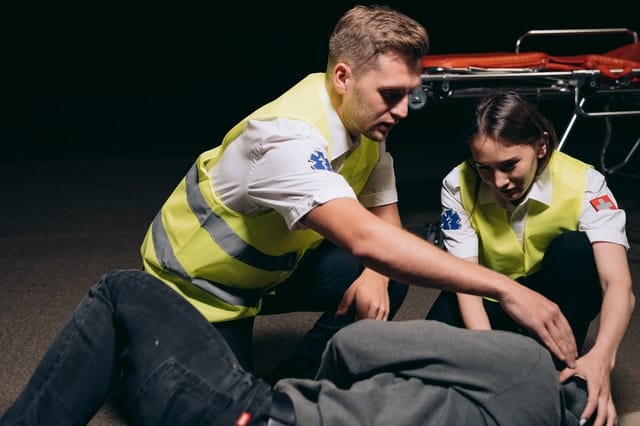Millions of people around the world use prescription medicines on a day-to-day basis.
They can help improve the quality of life for those living with a wide range of physical and mental health conditions.
However, some prescription medicines can be used more frequently or at higher doses than prescribed.
Individuals can become addicted to them or addicted to using them in tandem with other substances such as alcohol.
Being able to detect when someone is misusing a prescribed substance is essential for helping them avoid the dangers and harm that can come as a result.

The most common signs that an individual is misusing a prescribed drug are often those that impact the way they appear.
With the body attempting to process higher quantities of a prescribed drug, one of the key areas that can change in appearance is the eyes.
These changes can manifest in a few ways.
In particular, you should look out for bloodshot eyes.
This is very common among those who abuse substances.
Another key feature is dilated pupils.
Misusing a substance can affect the way the body functions, impacting metabolism and interrupting usual cycles of behaviour.
Both weight gains and losses are therefore common.
With many substances, the impact of misuse leads to weight loss as individuals lose their appetite and begin to obsess over the drug in question.
The importance of eating falls to the wayside both in their mind and bodily urges.

Using a drug beyond a prescribed limit can cause drastic fluctuations in body chemistry.
These alterations can disrupt processes that would otherwise proceed like clockwork, chief of these being sleep, resulting in sleep disorders.
As sleep relies on a sensitive balance of hormones and behaviours, those who begin misusing a prescribed drug can experience bouts of insomnia.
This can affect the body in observable ways, such as weight changes, greater irritability, and worse hygiene.
The chemical changes which result from the misuse of a prescribed drug can affect the hormones that impact the face and complexion.
Much like the changes caused by puberty, medicine abuse can trigger symptoms like acne, pale skin and jaundice.
Just like those who become addicted to recreational drugs and alcohol, those who have accustomed themselves to prescription drug abuse can begin to lose track of their personal hygiene, caring less and less about it as they become fixated on a substance.
This can be observed in general dirtiness, unwashed clothes, poor dental hygiene and bad bodily odours.

Abusing substances changes how individuals see the world and their role in it.
As a result, keys signs of prescription drug abuse can be detected in the ways a person behaves.
An individual who is misusing a substance is going to try their best to hide it.
This can result in them becoming more dishonest about what they are doing, lying more readily or hiding things.
They may begin hiding the packaging for their medicine, lying about what their prescription is, or tricking people into attaining more of their medicine on their behalf.
Similarly to the above, those who misuse their prescription medicine will behave more irrationally when it comes to the suspicions of others.
This will result from a combination of guilt and heightened anxiety because of skewed brain chemistry.
An individual may overreact to questions about their prescription, lashing out or projecting their fears onto others.
They may also push people away, keeping everything relating to their prescription very close to their chest.

As with those who become addicted to drugs and alcohol, individuals who misuse medicines can stray from the responsibilities and roles they have in day-to-day life.
This can manifest as a lack of ambition at school or work, tardiness, ignorance of house chores, distancing themselves from partners and children, or abandoning long-loved hobbies.
As prescription drug misuse becomes a greater part of an individual’s life, they will do whatever they need to in order to acquire more of it.
In most cases, this may mean returning to a doctor or pharmacist and asking for more doses.
This behaviour may also be accompanied by lies about the severity of their symptoms or where previous prescriptions have gone (they may say they have been lost).
Individuals may also visit several doctors or pharmacies in order to get as much of a substance as possible.

Just as with the body, prescription drug abuse can impact the mind and emotions:
The misuse of prescription medicine is going to impact the usual ebbs and flows of mental health.
Becoming dependent on and desperately trying to consume more of a substance is likely to trigger an array of conditions like anxiety and depression.
These signs are even more likely to point to medicine abuse if they appear when an individual has previously shown no or few signs of such conditions.
Obsessing about a prescription drug is going to make an individual place it at the centre of their life.
They begin to use it so much and so regularly that they struggle to imagine life without it.
This in turn means that the individual loses the motivation to engage in other activities and thinks less of themselves without the support of their prescription.
The turbulence of misusing a prescribed medicine will have a knock-on effect on emotions; a symptom that can vary from person to person and from instance to instance.
Generally, individuals will experience more frequent and more impactful mood swings, becoming angry, upset, irritable, and joyous with increased speed and power.

If prescription medicines are supposed to help people get better or live more ordinary lives, how can misusing them be so dangerous?
Despite the fact that they are provided by medical professionals, prescribed drugs can be very dangerous if misused.
When prescribed, these substances are provided with strict instructions that they only be used according to the recommended dose and timing.
Their effectiveness is dependent on this dosage, and varied use is not going to have the same beneficial effects.
As individuals begin misusing prescription drugs, they increase their risk of facing a number of dangers. [1]
Chief of these are drug use disorders – characterised by physical and psychological dependency and painful withdrawal symptoms – and the extremely serious possibility of an overdose.

With its various dangers, prescription drug abuse must be prevented at all costs.
Depending on who is at risk, there are a number of steps that can be taken to ensure none of the dangers outlined above can manifest.
Protecting yourself from slipping into drug misuse can be immensely difficult, but there are a number of ways you can help reduce the chances of misusing medicines.
If you are concerned about someone else misusing prescription drugs, there are both gentle and more forceful options for supplying help:

When it comes to young people, protecting them from drug misuse takes on a more severe tone.
They may not yet understand the risks at play, so these situations often call for more thorough and stern measures.
The most important things to address here are education and security. [2]
A young person must be taught the risks of misusing medicines and only be permitted to use them in a safe and supervised environment.

While it’s important to be able to detect the signs of prescription drug abuse, [3] it can also be invaluable to know who is most at risk of slipping into this pattern of behaviour.
Despite there being no certain cause-effect relationship between the below factors and misuse, there can be a heightened foundation risk that leaves particular individuals in greater need of guidance or support when it comes to the use of prescribed medicines.
Those who have fallen victim to a substance use disorder before are more likely to develop a prescription drug addiction.
Even if they have beaten their previous condition, their brain will still find it difficult to resist the pull of pleasurable substances.
It is worth noting that this has nothing to do with an individual’s character or motivation.
Addiction is a disease that refers to the body and brain’s ability to regulate a person’s reward system and encourage behaviours to be repeated.
Certain individuals have a greater in-built disposition to misuse certain substances, and this applies to prescription medicines.
For example, certain individuals can have a greater pleasure response as a result of taking certain drugs, or they may have a greater drug tolerance and need to take more to feel the beneficial effects that others may experience with less of a substance.

Even if a medicine is prescribed for the treatment of a physical health condition, the co-existence of a mental health problem can increase the risk of misuse.
This often results from the collateral effects of the medicine for soothing mental health symptoms.
An individual will therefore be incentivised to use more of it in order to feel better, even if their physical condition requires no increase in dosage.
The environment in which an individual grows up, lives, works or socialises can have a huge impact on how they behave, think about things, and process ideas.
If they spend a lot of time in a setting or with people who support the notion that misusing drugs is acceptable or desirable, an individual will be more likely to do it.
As simple as it is true, those who have greater access to prescription drugs are more likely to slip into prescription drug abuse.
This can result from an individual working in a pharmacy, living with someone with a medical condition, or having access to a medicine cabinet.

If you or a loved one requires help for prescription drug addiction, reach out today by dialling the number 0800 140 4690 for rehab enquiries.
Our friendly admissions officers will answer the call and will be at your disposal to answer any questions you have about the process of prescription drug addiction treatment and recovery.
We can also help you host an intervention for a loved one who is abusing prescription drugs, as well as give you all the information you need about the various residential and outpatient rehab treatment options in your area.
Every rehab in the UK that we recommend is vetted by the Care Quality Commission (CQC) in England and Wales or the Care Inspectorate (CI) in Scotland.
For free advice on how to get the best treatment for your addiction issue, reach out to our experts today.
[1] https://nida.nih.gov/publications/research-reports/misuse-prescription-drugs/overview
[2] https://kidshealth.org/en/teens/prescription-drug-abuse.html